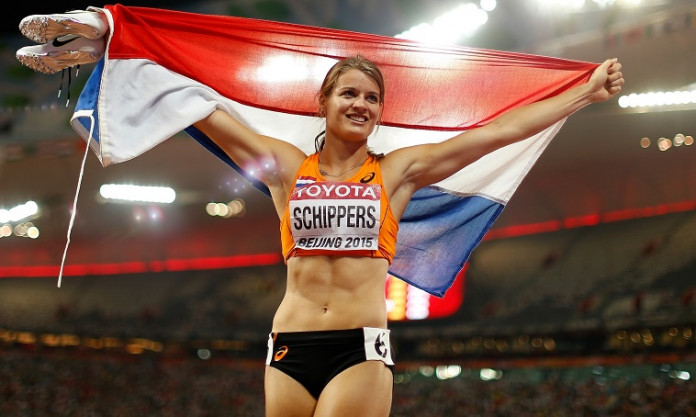Shortly after Dafne Schippers had summoned a performance of raging intensity and sheer bloody-mindedness to reel in Jamaica’s Elaine Thompson, she was so dizzy she had to see a doctor. Everyone else knew how she felt. This was the greatest women’s 200m final in history.
Until the last few desperate strides, when Thompson stumbled just as Schippers went supersonic, it appeared certain that Thompson would be adding another sprint medal to Jamaica’s ledger. But Schippers, the 23-year-old Dutchwoman – who decided only two months ago to ditch the heptathlon for the 100m and 200m – had other ideas.
The simultaneous dip for the line had the crowd gasping. But it was the times of the medallists that sent jaws crashing to the floor: Schippers 21.63, Thompson 21.66, Veronica Campbell-Brown 21.97. For only the second time in history, after the tainted 1988 Seoul Olympics final, three women had run under 22 seconds in the same 200m race. And within breathing distance was Britain’s 19-year-old Dina Asher-Smith, who ran the performance of her embryonic career to finish fifth in 22.07. Not only did it snatch Kathy Cook’s British record, which has been gathering dust for 31 years, but it made her the fastest teenager over 200m in history.
A flick through the record books put what we had witnessed into further context. Schippers is now third on the all-time list, behind only the notorious Americans Florence Griffith Joyner and Marion Jones, one of whom died early and the other whose reputation was shattered when she was outed as a drug-taking fraud. No wonder the first question to Schippers was whether she considered herself “the clean 200m world record holder”.
Schippers, understandably, did not want to head towards that murky alley. But when she was asked whether she could be trusted, she looked the questioner in the eye and replied: “I know I am clean and I know I work very hard for it.” Of course she did. What else would she say? What else could she say?
This is the world athletics now inhabits, where every stupendous performance is met with doubt. But Dutch journalists who have known Schippers and her coach, Bart Bennema, since they started working together insisted they were trustworthy. As Mark van Driel, a writer for De Volksrant, told the Guardian: “I have known Dafne since she was 16 and I believe her, because I have asked all the difficult questions many times and her answers are always convincing. And Bart is always open too.”
Bennema’s response when asked whether it was understandable that people might have doubts was certainly encouraging. “She doesn’t have the best predecessors,” he said, shrugging his shoulders. “Simple as that. She can’t help it.”
A scrum had gathered, and the questions kept coming until reporters’ minds had run dry. By then they had her life story, chapter and verse on her training, and heard that the acne Schippers suffers from – sometimes a hint of chemical assistance – runs in her family. “If you walk down the street in Holland I can point out 10 girls her age with that skin,” said Bennema. “I understand that it’s one of the things you have when you are doping but sometimes you just have bad skin. It’s unfair. It’s in her family.”
Van Driel confirmed he had seen Schippers’ sister had the same condition, and that it was a family trait which lasted until the late 20s.
Inevitably Schippers’ skin colour came up too. “I understand the question because she’s white but it’s not a factor for me,” said Bennema. “She just has the right genes. It’s the way it is. There was a Chinese girl in the final too.”
Bennema also reminded his audience of Schippers’ pedigree. Not only had she won medals at major championships in every year since 2010 but she had beaten the Olympic 200m champion, Allyson Felix, as a 19-year-old in 2011. “I first coached her when she was 16,” he said smiling. “She was stubborn like she is now.”
There was no hint that Asher-Smith – who begins her second year at King’s College, London, in three weeks – was disappointed after missing out on the podium by a tenth of a second. “I’ve run three personal bests three days in a row and ended with a British record,” she said smilingd. “I gave it my all.”
Like the rest of us, though, she was awed by what she saw in front of her. “I was thinking, ‘I know I’m really trying my best but they’re already gone, so what on earth is the time going to be?’ When I crossed the line I was flabbergasted. But they deserve it. I’ve got loads of work to do.”
Asher-Smith will celebrate with a slice of carrot cake when she arrives home on Monday – but before then she craves a 4x100m relay medal to accompany the bronze she earned as a callow 17-year-old in Moscow in 2013.
Once again, however, Schippers will be lying in wait and itching for a third medal in Beijing. In her home town, Utrecht, a great achievement is often rewarded by the participant having a street named after them. Those who witnessed her staggering display of willpower and horsepower will hope it is never torn down.














